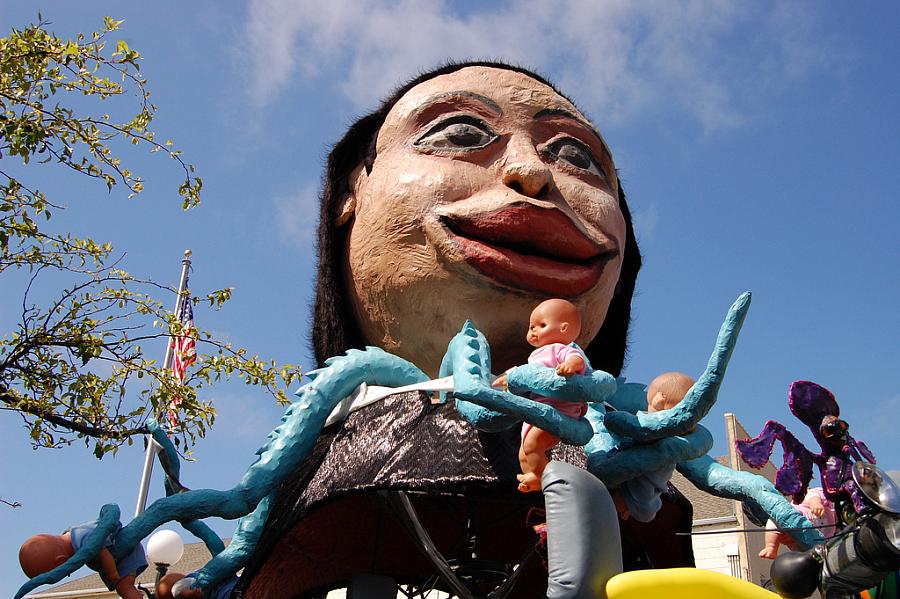Media should stop calling Nadya Suleman "Octomom"

Peg the moment the mainstream media lost its moral high ground to January 2009, when Nadya Suleman gave birth to octuplets in California.
From that point forward, Suleman was referred to as the "Octomom." Dehumanized by the name, Suleman was subjected to constant critiques of her sanity, her parenting skills, her love for her children and everything else all under the guise of serious reporting. (I stupidly used the slur, too, in two posts about how to investigate fertility clinics.) While not blameless, Suleman has become fair game for relentless and vicious innuendo. When two publicists offered to help her handle the media onslaught, they received death threats.
This week, when the doctor who implanted the embryos that became those eight children had his license taken away in California, the media had an opportunity to reframe the story. This doctor had put Suleman's life in jeopardy – and the lives of at least two other women – the Medical Board of California found. Suleman was lucky to have survived, and her children were lucky to have been born without severe disabilities, the board found.
And yet, once again the headlines read:
Octomom's Fertility Doctor Has License Revoked
‘Octomom' doctor's license to be revoked, state medical board rules
'Octomom' fertility doctor loses medical license
This is not how mothers of multiple children are usually portrayed in the media. Many of us remember how Newsweek wanted so badly to make Bobbi McCaughey, mother of the nation's first living septuplet, into a folk hero that it retouched a cover photo to make her teeth whiter.
But Suleman was single and sought fertility treatments to have her children, so that makes her less sympathetic, right?
Yet, every month brings us news of another single celebrity showing off a baby bump and playing coy about the identity of the father. Are these women pilloried?
This also is not how victims of medical misdeeds are usually portrayed in the media. Reporters – including this one – have made careers out of writing sympathetically about patients who suffer at the hands of physicians, hospitals, and insurance companies. Why is what happened to Suleman so different? In less than 10 years, she was given hormone stimulation drugs for 14 cycles and had embryos implanted in her 10 times. The doses of hormones were high enough that the board charged Kamrava with repeated negligent acts just for administering the hormones.
Yes, she chose to keep returning to Dr. Michael Kamrava for fertility treatments. Already the mother of six when the octuplets were born, she told the Today Show that she had been hoping only to have one more child when she went back to Kamrava in 2008. The medical board rightly placed the bulk of the burden on Kamrava, saying that "While the evidence did not establish (Kamrava) as a maverick or deviant physician, oblivious to standards of care in IVF practices, it certainly demonstrated that he did not exercise sound judgment in the transfer of 12 embryos" to Suleman.
What should Kamrava have done?
The board wrote that when Suleman came to him for more fertility treatments, he should have recognized that her behavior was "outside the norm" and referred her to a mental health professional. The board's expert in the case, Dr. Victor Yutaka Fujimoto, said that after Suleman's first four children were born, Kamrava should have recommended counseling.
I thought of Suleman last week when I attended a talk by Dr. Alex Cahana, the chief of the Division of Pain Medicine at the University of Washington. Cahana is a big believer in treating the whole patient, not just the patient's immediate symptoms. I asked Cahana about a recent Mayo Clinic study on a condition known as Morgellons disease. People who say they have Morgellons describe a constant sensation of horrible itching that causes them to scratch so hard they often bleed. The Mayo study said that Morgellons patients are suffering from a terrible fantasy.
Cahana said that he would not start by telling someone claiming to have Morgellons that needed to see a therapist. Instead, he would help them break down their symptoms and see if, together, they could identify a root cause. Perhaps there is a change in diet or routine that could be identified. Perhaps there is an allergy. Perhaps the person truly would need to seek psychological help.
The point is, Cahana told me, patients often feel powerless, and a good physician will help them empower themselves.
Suleman went to Kamrava as a troubled patient. A woman who wanted to have more children than any single parent could handle, she was treated instead by her physician as a customer. And now the media have chosen to treat her as a criminal.
At a minimum, she should be given the dignity of a real name.
Photo credit: Parade float of Suleman, courtsey of Erik Fitzpatrick via Flickr

